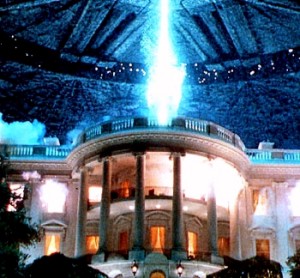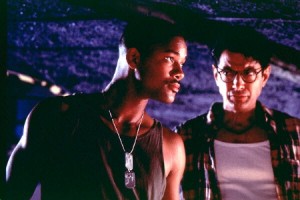|
So as I sit here typing this, I'm wondering two things: how long I'll be able to keep getting away with writing the bulk of my website at my job, and why in the name of all we hold dear do the rich and influential of Hollywoodland keep giving Roland Emmerich money? Let's look at that track record: Universal Soldier-Stupid. Stargate-Dull. Independence Day-Really popular for no real reason. Godzilla-Crappy flop or floppy crap; you decide. The Patriot-Ohh, don't even get me started on the awfulitude that was The Patriot, from the amazingly clumsy emotional manipulation to the flat-out historic nonsensery. He's had one real success, and a bunch of chaff, yet the Powers That Be Stupid keep shovelling truckloads of money at him with truck-sized shovels. Even now, his newest disasterathon is poised to take the big screen by a big CG storm, in a film with a title suspiciously similar to another end-of-the-world drama I think we all remember, if we haven't forgotten it. Isn't there someone-or given the size of Emmerich's typical budget, fifty someones-out there more deserving of such confidence? I, for one, would have to climb Mt. Everest, or at the very least a tall clump of grass, and scream "Heck yeah." So let's take at look at his main claim to fame, and see if we can pry out the reasons why.  Please note that by "we," I actually mean "me acting alone, just like Lee Harvey Oswald." We all saw the teaser a simptillion times, showing a big-ass laser beam making a matchstick collection out of the White House. It did look pretty awesome. In fact, given the present administration, it could even cause a modicum of irrepressible giggling. Who wouldn't want to see a film containing such a thing at least once? I know I did. The exploding shit was never the problem. The problem was the plot that kept getting wrapped around all the neat billowing clouds of flaming carnage, and the dialogue that people kept blithering in reaction to it. Frankly, you could have stopped the film at the point where all the alien spaceships laid waste to all those awesomely detailed model buildings, and I would have had little problem with the film, despite the fact that it would've meant that the whole thing was only about half an hour long. Quit while you're ahead, Roland. You don't get ahead all that often. Of course, before we can get to that point, we have to wade through a setup of all the main characters, including bits about how Will Smith is unsure of how marrying a stripper will affect his career in the Air Force, and how the support for the President (played by Bill Pullman) is waning. What does it matter? All their supporters and detractors will soon be laser muck! At least the conflict involving Jeff Goldblum and his wife actually carries over into the rest of the story. I say "at least" because it's the way a story ought to be structured, and not because that plot point is anything but a paint-by-numbers romantic reconciliation story. But anyway, after all this stuff and some decent buildup, the aliens rather spectacularly blow the living bejeezus out of everyone and everything. This part of the film I have no problem with. It genuinely looks way cool. It's the fact that there's a day after (getting a tingling sense of something closely related to déjà vu) that brings it the rest of the way down. Following the attack, the Air Force stages a counterattack against the aliens and get their asses handed to them on an ass platter, which, frankly, is exactly what would happen. After this point, the film starts to get outright silly. All the surviving characters manage to converge at Area 51, which the president somehow has never heard of even though it's not actually a secret base at all (you can find it on Google Earth, for crying out loud). Nobody denies the existence of the base, they just deny-for good reason-that it has anything to do with aliens. The whole Roswell non-incident gets dredged up again, even though it was such a minor blip on the public's consciousness when it happened that it went all but forgotten for nearly thirty years afterwards. Putting aside for the moment my general aggravation at our o'er-credulous public, there's also the fact that they somehow felt the need for the president to "mind-meld" with an alien captive in order for him to realize that the aliens mean to kill everybody, a fact which the mass, unprovoked assaults on large civilian population centers somehow failed to communicate to him clearly enough. Then there's Jeff Goldblum's irrational whining that combating the aliens with nuclear weapons over land will mean the end of the world, conveniently ignoring that most of the world is already a potboiled deathray wasteland, and that we've set off dozens upon dozens of nukes on our own soil already without it "ending the world." Why does he get more wigged about one nuke than he seems to about the disc-shaped green-beam depopulatatrons cruising about the skies? I would surmise it's because Roland Emmerich has a grossly distorted view of just how powerful nuclear weapons are, as evidenced by the climax wherein a single nuke jellifies an alien mothership the size of the fucking moon, in exactly the way a nuke wouldn't. I don't object to an ecological mindset, but I do object when it's based on complete bullshit. Plus, Robert Loggia plays a character whose sole function seems to be stating or restating the very obvious, and Randy Quaid plays a trailer-park stereotype who quips his way to glory in one of the silliest heroic sacrifices ever filmed.  It's also not too hard to notice that the film is a virtual remake of War of the Worlds, even down to the fact that it's a virus of sorts that turns the tide, because aliens who can build spacecraft the size of Rhode Island would have never dealt with computer glitches before. The final conflict is staged remarkably like the final seige of the Death Star in Return of the Jedi, a film which Emmerich admitted he admired for being able to make the final hour one long standoff. This is telling in several respects, mostly in the sense of what he failed to notice. These things would be: 1. He's wrong. The final showdown in Jedi is the last half-hour of the film. 2. The film had two entire previous films setting up the characters and conflict. 3. The most emotionally potent battle in Jedi is the smallest one. The Star Wars films weren't popular because they had big explosions in them, at least not solely; otherwise, Battle Beyond the Stars would've been just as big. Independence Day may be visually impressive, but it's all in the service of a TV movie-quality script. Indeed, it seems almost to have been made to air on TV in endless re-broadcasts; nothing in it is terribly TV-unfriendly, or challenging, or...anything. It's like something you put on in the background at a party when you want some noise going but don't want it to distract from the conversations unduly. As a big, dumb, noisy film, it's probably worth sitting through once, and there are some films I can't even say that about. But if that sounds like damning with faint praise, it is, because when you give a filmmaker enough money to feed every starving mouth in Ethiopia for a year and this is all you get, it leaves a bad taste, and not because he should've embezzled the proceeds in order to feed said starving mouths, but because out of all those millions of dollars, he could've chosen to feed the mouth of at least one talented scriptwriter. I guess the answer is "No, I can't pry out the reasons why." Ahh, failure. -review by Matt Murray
|
|
||||||||